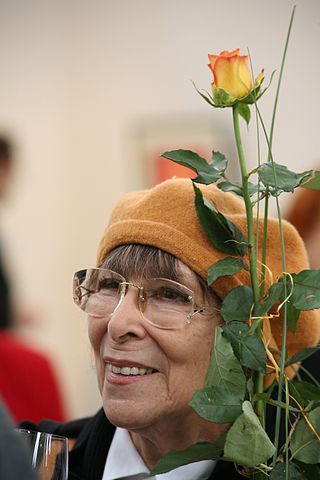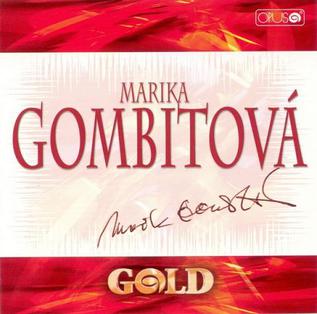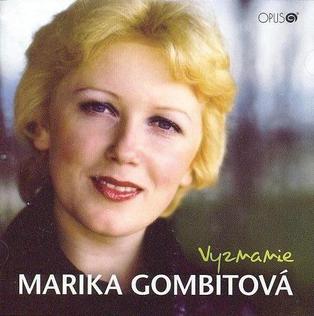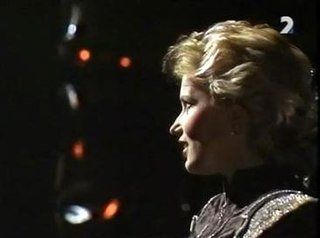| ||||||||||||||||||||||||||||||||||||||||||||||||||||||||||||||
| Awards won | 46 | |||||||||||||||||||||||||||||||||||||||||||||||||||||||||||||
| Nominations | 124 | |||||||||||||||||||||||||||||||||||||||||||||||||||||||||||||
Slovak recording artist Marika Gombitová has received numerous awards and accolades in recognition of her success in the music industry. At the turn of the 3rd millennium, she was named The Songstress of the Century, [1] [2] and her achievements in the music genre has made others to call her "The First Lady of Slovak Pop Music", respectively. [3] As of 2016, she has accumulated a total of 124 awards and/or nominations, and her list also includes a number of music recording sales certifications. [4]
Contents
- Music awards
- Bratislavská lýra
- Grand Prix Rádio
- Internationales Schlagerfestival Dresden, Germany
- Intervision
- Melodie
- ZAI Awards
- Video music awards
- Chvíľa pre pesničku
- Vyberte si pesničku
- Našich 9
- 6 + 1
- 5 x P
- Zlatý triangel
- Music polls
- The 100 Greatest Slovak Albums of All Time
- Český slavík
- Diskoslavík
- Hit storočia
- Mladé rozlety
- OTO Awards
- Pop Music Top Slovakia
- POPulár
- Slávik
- Slovenský slávik
- Zlatá nota
- Zlatý slavík
- Music recording sales certifications
- ČNS IFPI
- Other honors and achievements
- Čestné občianstvo
- Honorific titles
- Miková Festival of the Rusyns Culture
- Slovenka Awards
- Ústí nad Labem
- ÚV SZŽ
- Žena 21. storočia
- See also
- References
- Bibliography
- Further reading
- External links
Her double win at the Bratislavská lýra with "Študentská láska" became a significant milestone in her solo career in 1978, [5] which later led to the award's Silver in 1979 and Bronze equivalent in 1980 (the first for "Vyznanie", [6] while the second for her duet "Tajomstvo hier" with Lehotský). [7] Prior to surviving a car accident, she was bestowed an Intervision award from the East European International Radio and Television Organisation in response to her live performance of songs "Vyznanie" and "Chcem sa s tebou deliť"; accomplished in Sopot, Poland in 1980. [8] [9] Besides, her signature song — "Vyznanie" — won the countrywide competition run by Slovak public television network in 2007 as The Hit of the Century. [10] [11]
In a career spanning more or less three decades, Gombitová has sold more than million solo albums during the vinyl era. [12] [13] On March 2, 1996, she became the first female performer, so well one of the first inductees ever to be inducted into the Hall of Fame by Grand Prix ZAI academics. [14] [15] She also holds the record as the artist with the most releases listed in The 100 Greatest Slovak Albums of All Time. [16] [17] Six of her solo studio albums were ranked as some of those best, and the overall index features also her vocal contribution to additional nominated albums (such as co-recorded with Modus and Žbirka, or delivered for Neberte nám princeznú soundtrack). [17] [18]
Aside from her critical accomplishments, Gombitová has been frequently voted in national annual music polls, namely Zlatý slavík and its subsequent equivalents, i.e. Slovenský slávik and Slávik. [19] While eventually winning two editions (1997–98), [20] she topped eight times (1980, 1982–83, 1998, 2000–02, 2005) as the second Most Popular Female Singer in the country, [21] despite showing no particular interest in accepting these recognitions. [22] For her other cultural and/or lifetime achievements, she is also a recipient of the Main Prize by the Culture Ministry of the Czechoslovakia (1986), [23] Freedom of the City (2007) of her birth municipality, [1] [24] as well of the town of Stropkov (2013) [25] [26] and, among others, The Woman of the Year title (2008) [1] [27] and the Hall of Fame OTO Award. [28]


















